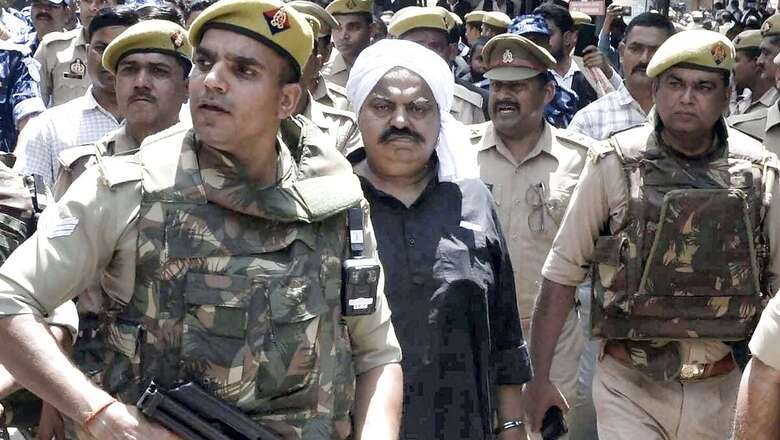
views
On February 24, Umesh Pal, a key witness in the Bahujan Samaj Party (BSP) MLA Raju Pal murder case that took place in 2005, was shot dead in broad daylight.
Following the incident, Chief Minister Yogi Adityanath made a fiery speech in the UP Legislative Assembly ahead of the discussion on the motion of thanks on Governor Anandiben Patel’s address delivered a day ago.
His speech would reverberate in the occurrences that followed Umesh Pal’s killing. He made it clear that his government would completely “raze off the mafias to the ground”.
Apart from this proclamation, he also accused Samajwadi Party of “nurturing mafia” dons like Atiq Ahmed whose son was the prime accused in the murder of Umesh Pal and was killed in a police encounter on April 13.
While the proclamation became the anthem for Yogi Adityanath’s supporters, his accusation of the Samajwadi Party nurturing mafias had a deeper resonance.
The story of Atiq Ahmad is a tell-tale of the deep malady that inflict the body politic, that is, the criminalisation of politics.
Milan Vaishnav is a senior fellow and director of the South Asia Program at the Carnegie Endowment for International Peace and has written a well-researched book on the issue of crime-politics nexus titled ‘When Crime Pays: Money and Muscle in Indian Politics’.
The beginning of the book starts with an anecdote that shows the utility and inevitability of the Bahubalis as the mafia dons are referred to in the larger part of the Hindi heartland. Vaishnav writes that in July 2008 the United Progressive Alliance (UPA) government led by the Congress was staring down at the prospect of a no-confidence vote as the Left parties which had an important presence in the coalition decided to withdraw their support because of the nuclear deal with the US.
Vaishnav writes, “To avoid the defeat, it (government) turned up for help to an unexpected source: the bowels of the country’s most notorious jails. Inside those cells sat six MPs who though charged or convicted for serious crimes, still retained crucial votes that could tip the balance on the floor of Parliament”.
Forty-eight hours before the trust vote, the country’s most notorious criminals were furloughed and brought to Delhi.
Among them was Atiq Ahmed who was recently killed in Prayagraj.
Atiq Ahmed had more than 100 cases registered against him that included cases of heinous crimes like murder, kidnapping, extortion, and arson.
While the need of these criminals to save the government is a story of desperation and hopelessness, the bigger question is how they came to occupy such a position.
Others who accompanied Atiq Ahmed included Pappu Yadav and Mohammed Shahabuddin.
In Bihar, the name of Pappu Yadav is synonymous with Bahubali wielding political power. He won the Lok Sabha elections in 1991, 1996, 1999, and in 2004, and 2014 from several constituencies in Bihar as an Independent, Lok Janata Party, and RJD candidate. He was convicted for the murder of Communist Party of India (Marxist) MLA Ajit Sarkar which took place in 1998 by the sessions court and spent over five years in jail before being acquitted by the Patna High Court.
Mohammad Shahabuddin was elected four times as a Member of Parliament from Siwan, Bihar, on Rashtriya Janata Dal (RJD) ticket. He was accused in several serious criminal cases and has been convicted in many. In March 2007, a Siwan court sentenced him to two years’ imprisonment in an assault case. In May 2007, he was convicted in an abduction case. He was also accused of the murder of JNU student union leader Chandrashekar Prasad, which took place in 1997.
They both belonged to different parties, and other parties of the state also had their own Bahubalis.
It is a fact that political parties cutting across ideologies and regions allows the entry of criminals into politics. The pertinent question that should be asked here is: why do political parties field such candidates? and why do people vote for them?
As to why voters prefer such candidates, Vaishnav goes beyond the ‘ignorant lot’ hypothesis and sees it as an attempt by the voters to secure an extra-legal avenue to protect their interests in the wake of weakening public institutions.
As for the question that why parties field such candidates, based upon field research and crunching of hard data Vishnav concluded it is ‘winnability,’ that is the main reason.
“Across the past three general elections, ‘clean’ candidates had a win rate of six percent. The win rate for candidates facing a charge of any type, by contrast, was just above 17 percent, and those facing serious charges had an 18 percent chance of winning. While there is some variation in the prevalence of candidates with criminal cases across parties, this is not an issue facing any one political party or type of party: It is clear that criminality in politics is widespread,” Vaishnav wrote in 2017.
Currently, another mafia don from Uttar Pradesh who is facing the heat of the law is Mukhtar Ansari. He has been a Member of the UP Legislative Assembly five times and was the prime accused in the murder of another MLA from Uttar Pradesh named Krishnanand Rai. Ansari won his first election on a BSP ticket.
There have been several changes made in electoral law in the last two decades to debar the criminal from contesting elections and to dissuade people from electing such people. In 2003, through a landmark judgment, the Supreme Court made it mandatory for all the candidates to furnish information regarding any criminal case registered against them. This was done with the intent to make the voters aware of their representatives and dissuade them from electing people with criminal antecedents.
Further, now the electoral law disqualifies any lawmaker from his post if he/she is convicted of any offence and sentenced to imprisonment for not less than two years. Also, the law mandates that after being convicted the lawmaker remains disqualified for another six years after serving time.
However, these laws seemingly have hardly dissuaded criminals from entering politics. According to the Association of Democratic Reforms (ADR), which analysed the signed affidavits of candidates contesting the 2019 Lok Sabha elections, around 19% of them were accused of heinous crimes including rape, murder, and kidnapping. Perhaps, the money and muscle powers that these Bahubalis have has become an indispensable part of politics thus creating their indispensability.
It is said that politics is the last refuge for the scoundrel. But when winnability becomes the sole aim, politics becomes not the last but the easiest refuge for the scoundrel.
Read all the Latest India News here

















Comments
0 comment